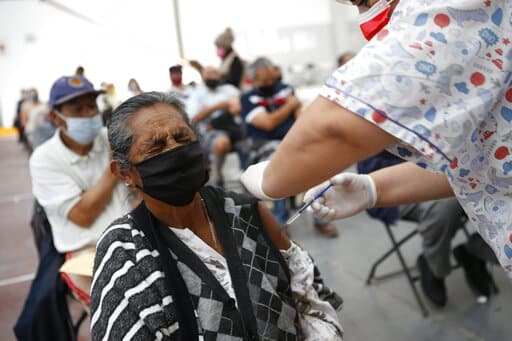MEXICO CITY (AP) — Mexico’s president lashed out Tuesday at criticism of the country’s coronavirus vaccination effort, dismissing a pair of scandals as the work of conservative opponents or grumpy “elderly people who go grumbling because they don’t like to be vaccinated.”
Despite some successes — for example, all shots are free — there have been problems with the country’s uneven vaccine roll-out, which employs vaccination sites of varying quality and vaccines from half a dozen different manufacturers.
Mexico’s first round of vaccinations targeted health care workers, and the current second round is for those over 60.
An 84-year-old man suffered a heart attack and at least three others fainted after waiting in line for hours outside one vaccination station in the northern state of Coahuila, and a man was stuck with an empty needle at another center on the outskirts of Mexico City.
Some wealthier neighborhoods offer well-tested vaccines at shady vaccine centers with short lines, while elderly people in other, poorer or more outlying areas have been forced to stand in line in the baking sun for hours or receive less well-documented vaccines.
That has posed a problem for a president whose slogan is “the poor come first.”
Mexico has obtained more vaccines than many Latin American nations, with about 15 million doses arriving so far and about 9.3 million administered, behind only Brazil and Chile.
But the rollout has also been characterized by marked inequalities. Mexico is now using at least six vaccines made by different manufacturers, some of which have released full data on their effectiveness, but others of which haven’t.
The government is using two Chinese vaccines, made by Sinovac and Sinopharm, without releasing its own data on their effectiveness.
For example, residents of two of the country’s wealthiest neighborhoods, Las Lomas de Chapultepec and Polanco, got the well-tested and effective Pfizer vaccine. Other, poorer neighborhoods got a mix of AstraZeneca or Chinese vaccines.
Last week at a vaccination center in the upper-middle-class Roma neighborhood, lines were relatively short and volunteers quickly and politely ushered elderly people through the process, sometimes in less than an hour.
At the city’s Vasconcelos Library serving poor neighborhoods, long lines snaked through a sunbaked parking lot and spilled into the street outside. Users reported waiting longer than two hours for shots. Both centers used the AstraZeneca vaccine, which has faced questions in Europe over possible links to blood clots.
Clearly, not all experiences in poor neighborhoods were bad, nor were those in wealthier neighborhoods all good. But it seemed reports of any of the incidents drew the president’s ire.
Over the weekend, a nurse-trainee at one vaccination station on the outskirts of Mexico City was filmed jabbing an elderly man’s arm with an empty syringe and then quickly withdrawing it, without injecting him with anything.
The nurse’s university and local authorities quickly described it as a simple mistake. They said the volunteer realized what had happened and rectified it by injecting him with the dose he was supposed to receive.
But President Andrés Manuel López Obrador — who sees almost any criticism as an attack by foes he describes as “the conservatives” — suggested the situation had been planned to smear him.
“There are only two explanations: either that was in effect an error, or that it was a set-up intended to damage us, and I don’t rule that out, because of the coverage it received,” López Obrador said Tuesday.
Long waits to get vaccinated came to a head in the northern city of Torreon, in Coahuila state, last week after the president of the state Human Rights Commission, Hugo Morales, confirmed that one 84-year-old man suffered a heart attack after waiting in the sun for three hours to get a shot.
Morales said the commission documented three elderly people who fainted after waiting for hours in the sun at a vaccination center in the same city on March 29.
“Elderly people were waiting in line for periods of as long as six hours,” Morales said. He said the man who suffered the heart attack was in critical but stable condition.
Despite suggesting to federal authorities — who run the vaccine program — that they provide shelter against the sun or water for those in line, Morales said that as of this week, nothing appears to have been done to address the situation.
“They have done absolutely nothing,” he said. “There are no awnings, no hydration stations.”
In large part, the vaccination campaign reflects previous trends in López Obrador’s administration, like his irritation in the face of criticism.
The president entrusted most of the vaccination logistics to the armed forces, something he has done with most of his major projects since he took office in late 2018.
The president has also sidelined the private sector, which accounts for much of Mexico’s health care, in favor of having the government handle the entire vaccination effort so far, even when private hospitals or drug store chains might be better equipped and located to handle some of the vaccinations.
López Obrador is a declared fan of big government solutions in most parts of the economy, a trend that has put him in conflict with private companies in the energy and construction sectors.




